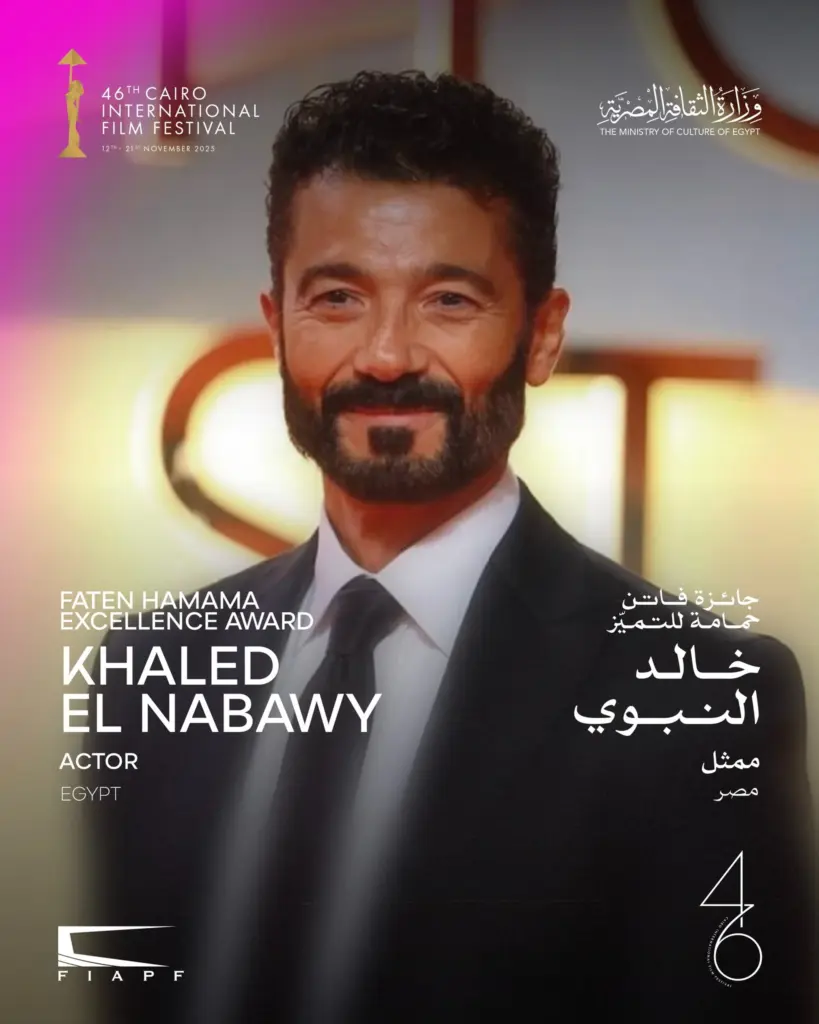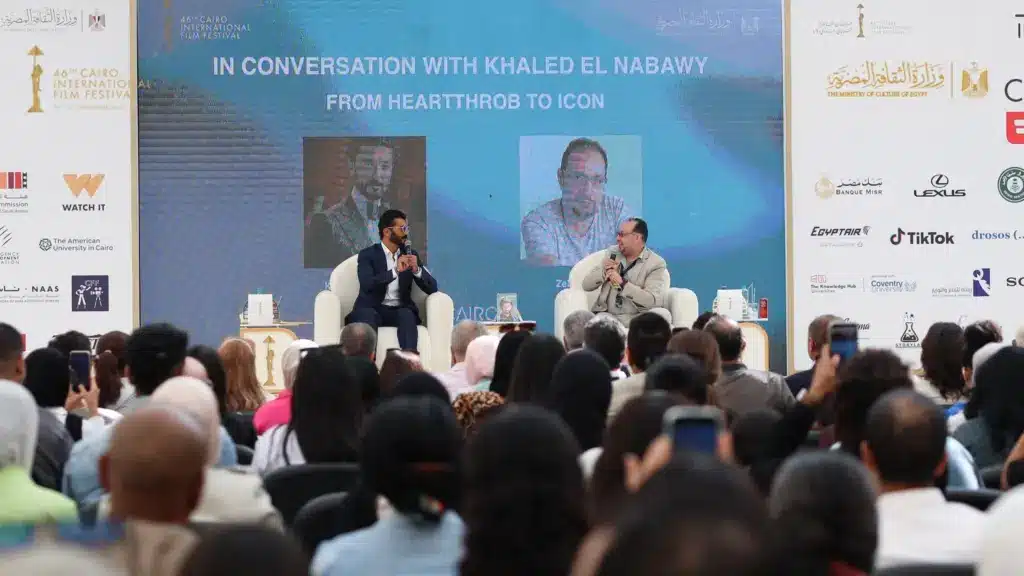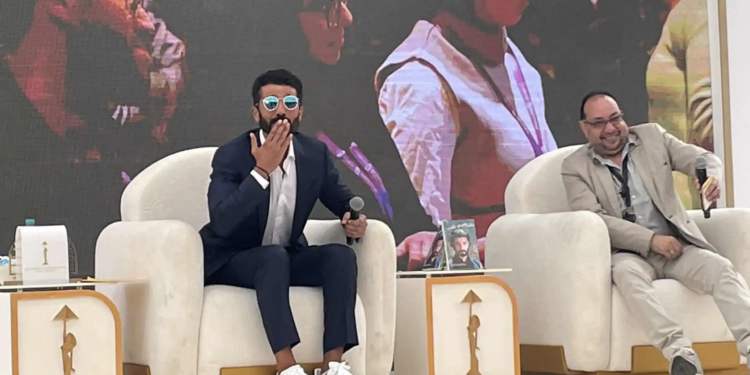Late on Sunday, November 16, the open-air theater of the Cairo Opera House seemed suspended in a gentle, amber light when Khaled El Nabawy stepped onto the stage for a conversation with the public during the Cairo Industry Days. Four days earlier, the Cairo International Film Festival (CIFF) had honored him with the Faten Hamama Excellence Award, a distinction celebrating a trajectory that has become one of the pillars of contemporary Egyptian cinema. Guided with tact and sensitivity by critic Zein Khairy, the encounter offered more than memories: it opened a window onto the inner architecture of a man who has made acting not only his craft, but his way of inhabiting the world.
Zein began with a story that immediately created intimacy. Twenty-five years earlier, his father had written a screenplay and invited a very young actor to their home. When the doorbell rang, it was Zein—then little more than a boy—who had opened the door. The shy, attentive visitor he welcomed that day was the same man now seated across from him, celebrated and admired. The audience smiled at this quiet symmetry, and the dialogue began with a sense of time folding in on itself.
A brief video revisiting El Nabawy’s roles set the tone, and when he spoke, he chose to return to the beginning—an unexpected beginning. He had never imagined becoming an actor. He wanted nothing more than “a job I would enjoy, one that would allow me to earn a living.” His father had hoped he would study medicine. Instead, Khaled enrolled in agricultural studies, a choice that satisfied no one, least of all himself. Bored, detached, he spent his days in the cafeteria rather than in class.
Until one afternoon, he noticed a door marked “Theatre.” He opened it out of curiosity. The director, who refused passive observers, handed him a text and asked him to read. He read—and was cast in the leading role on the spot. He left determined never to return. But when the director later warned him that avoiding rehearsals would mean failing the course, he came back. It was during the first movement rehearsal that something within him settled. He recognized a place where he belonged. His mother supported him at once. His father relented only after seeing him perform on stage.
From this chance encounter with the stage, El Nabawy drew a principle that has guided him ever since: acting demands absolute discipline. Not discipline as constraint, but as a form of respect—for the work, for the team, for the responsibility an actor carries. “An actor cannot arrive late, cannot fall ill, cannot break the rhythm,” he said. Too many people depend on him. A single lapse may disrupt an entire day of filming. The institute had taught him this early on: even a minor role is part of a larger movement. And from his masters, he learned the same lesson in different forms. Mohamed Abdelaziz taught him discipline; Salah Abou Seif insisted that each film must surpass the previous one; Abdelmonem Madbouly, whom he speaks of with almost filial affection, shaped his earliest instincts on stage.

Inevitably, the conversation turned to Youssef Chahine. The Emigrant, shot when El Nabawy was still very young, resurfaced like a decisive threshold. Zein asked about the scene where Ram runs beside a moving car to warn about water. Chahine had asked that the actor be tied to the vehicle with a rope so they would move at precisely the same speed. “If the car went too fast, I would fall,” he recalled lightly, without dramatization. It was not bravado—simply Chahine’s unyielding precision.
Even more striking was the brief fire scene. It lasts only seconds on screen, yet on set he saw technicians working with an intensity that left him shaken. “I felt ashamed,” he admitted. That is why, during the award ceremony, he dedicated his honor to them—those whose work often remains invisible.
At this moment in the conversation, he shared one of the most meaningful turning points of his career: the gesture of Ines Deghidi. Before Chahine offered him The Emigrant, El Nabawy had already signed a contract with her for Disco Disco. When Chahine told him he needed him fully dedicated for an entire year, Khaled went to her in concern. She could have insisted on the contract. She could have stopped him. Instead, she said: “Run to Youssef Chahine. I release you from your contract.” He recounts this with a gratitude that has not faded: “I cannot imagine what my career would have become if she had asked me to stay.”
Throughout the conversation, his choices appeared governed by a personal ethic. He has made only twenty-five films in thirty-five years, a number he embraces. He refuses repetition. He prefers to seek roles that shift something within him. He revealed, with a smile, that he dreams of playing a women’s coach—without elaborating further: “God knows what that means.”
His sense of responsibility extends to the representation of Arab characters abroad. He recalled a foreign production in which a costume designer wanted his Iraqi doctor to appear poorly dressed. He refused. “A doctor may own only one shirt,” he said, “but it is clean.” In The Citizen, he insisted on the innate elegance of his Lebanese character.
This vigilance also shaped his theater work. When he portrayed Sadat in the United States, he rejected lines that distorted the image of Arabs, especially during performances for students. “We are not weak,” he said. “We are peaceful, but not weak. We have a culture, and we understand what is before us.”

Several interventions from the audience enriched the portrait. Director Kamla Abu Zekri, who worked with him on Wahat El Ghouroub, spoke of her first impression: when she read the novel, she immediately saw him in the role. At first she was intimidated—he had worked with the greatest. But she soon discovered an artist of remarkable precision. On the first day, when she asked him to enter a room and knock on the door, he asked how to knock. Then how to step inside. She wondered, amused and impressed: “How will we shoot thirty episodes like this?” She joked that she finally limited him to “one question per episode.” She said she learned enormously from him and concluded that he could have earned more or acted more often, but that he chooses to remain faithful to his principles.
Producer Gaby Khoury brought a moment of lightness: “He spoke about everyone—teachers, technicians, actors… but not a word about the producers!”
Journalist Mahmoud Saad recalled a private screening of The Emigrant with Yousra. He did not yet know the young actor sitting beside her, but when Ram appeared on screen, the resemblance between talent and presence was unmistakable.
Critic Rim Chaker returned to a pivotal memory: the screening of The Emigrant at the Carthage Film Festival in 1994. The Tunisian audience had lifted the young actor onto their shoulders. She wondered how he had survived such sudden triumph. He smiled, thanked Tunisia, and shared a moment of humor: Chahine, watching the scene, had told Gaby they should reserve him a room in a psychiatric hospital. Gaby had replied, “Not a room—a suite!”
Khaled explained that success never overwhelmed him because he had watched those who came before him and wanted to belong to that larger history—those before him, and those who would come after.
His son, actor Nour El Nabawy, added a gentle testimony. His father, he said, never taught him how to act, but how to live. What he admires most is that he speaks about ideas, never about people or trivialities. He continues to learn from him today.
As the conversation unfolded, the portrait that emerged moved far beyond the image of a successful actor. It was the story of a man who entered a theater room by chance and discovered, not a career, but a way of standing in the world.
He often summarizes his philosophy in a single sentence: “Be different, even if you must stand alone.”
When he says it, it is neither a lesson nor a warning. It is simply the truth of his path—one that explains the roles he chooses, the contracts he negotiates, the image of Arabs he defends on screen, the gratitude he shows technicians, the reverence he holds for elders, and the wisdom he passes on to his son.
That Sunday in Cairo, the encounter celebrated more than an actor. It revealed an inner coherence: discipline as a form of elegance, precision as a moral choice, and dignity as a way of walking in the light.
Neïla Driss








